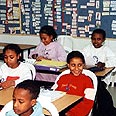
Ethiopian children. Allow them to study without prejudice
Photo: Dafna Makel

Ethiopian students studying together in Haifa classroom

Shoshi Becker. 'Much work for education system'
Photo: Motti Hakshur
Poll: Cut budget of schools that discriminate
With school year around the corner, Ynet-Yesodot survey finds that majority of public will not tolerate discrimination in schools, supports cutting budget, even closing schools who don't show equal treatment of all students. Picture slightly different when it comes to whom public is willing to have as neighbors
With the school year about to start, a special survey conducted for Ynet found that 55% of the population believes that schools unwilling to accept Ethiopian students into their student body should be punished and their budgets cutback. Some 28% percent of the survey respondents went further, saying that such schools should be closed down. Only 17% of the respondents believe that attempts should be made merely to convince such schools of the importance of absorbing Ethiopian children.
Last April, parents in Petach Tikva went on strike against four schools for the city's unequal treatment of Ethiopian pupils within the city's school system. In December 2007, it was revealed that four students in the city's religious school, Merhav, were subjected to humiliation and discrimination because of the color of their skin.
The joint Ynet and Yesodot Center for Torah and Democracy survey was conducted by the market research company, Panels, and interviewed 511 respondents representative of the adult Jewish population in Israel.
Racism
Daniel Edelson
Woman recounts humiliating experience in which bus driver told her, 'Kushit, in Ethiopia you didn't even have shoes and here you do, so why don’t you walk?'; Egged to investigate incident
Participants in the Yesodot-Ynet survey were classified according to their religious observance – secular, formerly religious, and haredi.
The survey revealed that secular and formerly religious people support a practical solution to discrimination in the education system, even if this may mean harming studies and the interests of students. On the other side of the spectrum, haredim prefer to avoid touching the budget or closing a school, even at the expense of continued discrimination in school.
Of the secular and formerly religious population, 58% believe that a school's budget should be cut, while 27% percent even claim that a discriminating school must be closed. Only 15% believe that the only step that should be taken is persuasion not to discriminate against minority students.
Of the Haredim, on the other hand, 17.4% support closing a school in such a case, while 21.6% support budget cutbacks, with the overwhelming majority, 61%, supporting only persuasion efforts to curb the offending schools discriminatory behavior.
Who needs to absorb the immigrants?
On the question regarding which schools need to absorb students of Ethiopian background, 52.8% of all respondents – secular, religious, and haredi alike – responded that all schools are responsible for absorbing these students. Some 40.9% of respondents believe that the students should be asked where they would like to study. Only 2.7% of all respondents believe that the students should be sent to secular schools, and 3.5% believe they should be sent to religious schools in order to learn about Judaism.
And which immigrants would you prefer to have as a neighbor? Immigrants from the United States are the most sought after, with 33.7% of respondents saying they would be glad to live near them. Immigrants from former Soviet states received 3.9%, immigrants from Ethiopia registered in with 1.2%.
Two percent of the respondents admitted that they would not like to have a neighbor from any of these groups of immigrants. A majority of respondents, however, responded that they do not differentiate between immigrants based on their country of origin with 59.3% saying they give each group equal priority.
Shoshi Becker, educational director of Yesodot Center for Torah and Democracy, said in response to the survey findings, "At the start of the Ethiopian immigration, there was a tendency to send most of the immigrants to public religious schools in order to preserve their connection with tradition and Judaism. The survey shows that most of the public believes that the task of absorbing Ethiopian immigrants must be divided equally among all sectors, and not just given to the religious public.
"A notable percentage even views the parents of these immigrants of capable of choosing the appropriate education for their children and should be allowed to exercise this right. A decisive majority of the public believes that the Education Ministry must cut the budgets of schools unwilling to integrate immigrant populations into their student body. A third of the population even supports closing such schools."
However, Becker continued, "The public is a bit less tolerant when it comes to their neighbors. The survey shows that there is much work to be done within the education system and by social organizations to develop tolerance and openness to the other and the immigrant.















